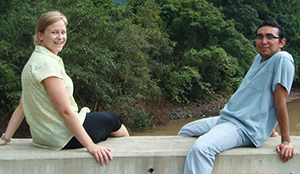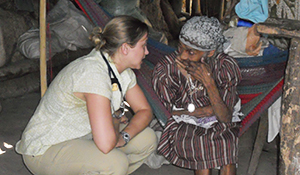

Embracing Global Lessons
The Education of Nicole Ruske
Education is about more than what can be learned in a classroom.
Nicole Ruske knows this well. The fourth-year Einstein medical student recently took a year off to embark on a life-changing adventure in Estancia, El Salvador, as part of the nongovernmental organization Doctors for Global Health (DGH), in partnership with the local nonprofit Peasants (Campesinos) for Human Development (CDH).

Ms. Ruske with her El Salvadoran mentor, Dr. Juan Carlos Martinez "The experience has made me more confident in everything I do," she said of volunteering at CAIPES clinic.
Before going to Estancia, the Colorado native had done little traveling. Her Einstein interview was her first trip to New York.
"I fell in love with Einstein," she said. "The school’s social consciousness impressed me."
It was Einstein’s global health program that allowed Ms. Ruske to travel while honing her medical skills. Upon completing her first year of study, Ms. Ruske traveled to Ecuador with Family Health International, working with the Shuar Indians — learning about natural medicine while witnessing difficulties the tribe faced seeking outside care. The experience changed her significantly.
"I wanted to do more," she said. "I asked, what else is out there?"
After hearing Dr. Lanny Smith speak about DGH, the organization he had founded in 1995, she e-mailed him about volunteering in Estancia, where DGH members have been working with local nonprofits since 1992 and teamed with the local campesinos who established CDH. She eventually was accepted to take part and, from July 2011 through May 2012, Ms. Ruske made Estancia her home and El Salvador her classroom.
"Each day was a new lesson learned," she said.
Lesson #1 – You Can’t Change the World, But You Can Assist

Speaking with a patient during a home visitEstancia had been ravaged by civil war and was suffering from extreme poverty and disease.
"I wanted to change everything — get kids to go to college, provide birth control to all the girls, make everyone boil their water," she recalled. "But I was there to help the community be a better, healthier place, not to tell them what that meant or how to do it."
The future physician quickly realized it was more important to listen and learn. For example, the community reveres its elders, so Ms. Ruske worked with the local health promoter, Etelvina Umaña, along with other volunteers to implement a program of lectures for educating seniors about various health concerns. The lectures were designed to help community members, many of whom rely on social and cultural conventions, to better understand the medical aspects of their healthcare.
During one lecture, after taking the blood pressure of the 75 seniors in attendance, Ms. Ruske used bags filled with water to explain the numbers. Those with high measures received follow-up appointments. At least two new cases of hypertension were discovered and treated.
She and her colleagues also administered a Women’s Health Assessment Survey on topics including pregnancy, sexually transmitted diseases, cervical cancer and domestic violence. The survey offered Ms. Ruske an opportunity to provide valuable education and mini-therapy sessions to the women.
But more often Ms. Ruske’s plans focused on the goals of the people, as she learned to do from Ms. Umaña, a native of the town of El Rodeo who has been involved with the project since 1996. Under Ms. Umana’s tutelage, Ms. Ruske came to realize that the people know their needs best and she should set aside her own notions about what would be ideal for the community.
The people truly know what’s most important for helping their community," she noted. "For example, while I initially planned an anti-parasite campaign in San Miguelito, they were organizing to get water to their homes. Water is certainly a more critical priority and, working with the community taught me to be open to the lessons people can provide."
Lesson #2 - Clinical Skills and Clinical Judgment
During her global health fellowship, Ms. Ruske worked under close supervision with Dr. Juan Carlos Martinez, a Salvadoran doctor who serves as medical director for the clinic. The medical student calls Dr. Martinez a great mentor, and as a result of his leadership, she had the opportunity to work with patients to manage diseases such as acid reflux (or GERD), urinary tract and respiratory infections, and chronic illnesses like hypertension and diabetes. She also performed small procedures, such as suturing of lacerations, draining of abscesses, and the removal of botfly larvae. Her confidence in performing these procedures continues during her current work in an Indian Health fellowship on the Blackfeet Reservation, in Montana.

Leading community members in some stretching exercises"With each procedure I do, I can sense the growth in my skills that began in El Salvador," she said.
Estancia prepared Ms. Ruske well, as she identified creative ways to communicate with patients about diseases, treatments and follow-up procedures. "Making simple drawings or imitating heart sounds became a regular activity for me," she noted.
Of course doing this for 25 patients a day, split between her and Dr. Martinez, at an average of three an hour, was no easy task.
"Considering most family medicine interns see one to two patients an hour in clinic, I feel I’m well prepared for residency training," she said.
She also feels she improved her time management skills through the long-distance telephone rounds held each week among Dr. Martinez’ team of DGH volunteers and the organization’s attending physicians.
The rounds are 45 minutes and require the student to concisely present a case to four rotating physicians, who specialize in pediatrics, family medicine, medicine/pediatrics and internal medicine. "The presentation typically involves a patient who has a complex medical condition requiring expert consultation, sometimes at a level that may go beyond primary care," explained Dr. Smith.
"The ability to work from a complex medical presentation in a patient to a concise presentation of his/her condition is a skill much prized in many areas of medicine, and especially useful in residency and consultation services," he added.
Lesson #3 - Spanish and Cultural Competency
While Ms. Ruske had always felt competent with Spanish, she can now, after almost a year immersed in the language, follow "95 percent of all conversations" and respond accordingly.
"This ability will be invaluable in working with disadvantaged populations, among which many individuals solely speak Spanish," she said.
Cultural differences were also an obstacle.
"I encountered many misconceptions about healthcare," she said. "For example, some individuals who got sick would go to their local pharmacy and request an antibiotic, rather than the treatment specific to their need. Then, they would wonder why they weren’t getting better. This taught me that greater education around treatment regimens is very important."
Lesson #4 - Just Being There Makes a Difference
The presence of DGH working for decades with the community of Estancia is evidence that people around the world still care about El Salvador. But it isn’t just the medical care that has made a difference.
"While I did important work that contributed to bettering the health of the community, it was more important to simply be there for the people," explained Ms. Ruske.
She joins many of her predecessors in remaining an active member of DGH, helping arrange for new volunteers to go to Estancia, where they can work with the community so that the clinic retains its sustainability going forward.
Dr. Smith believes Ms. Ruske will grow from her experience in Estancia to become "a doctor who puts her full intelligence and motivation toward being there, in spirit and practice, for the community and the individuals within it."
Ms. Ruske hopes those words ring true and that she can continue to give back.
"The smallest acts often have the biggest impact," she said. "This is the most important lesson I will take away from my experience in Estancia."
Photo Gallery
(To view slideshow of photo gallery, click on an image below; then move your mouse over the left or right margins to navigate.)
Posted on: Thursday, September 27, 2012













Tablet Blog